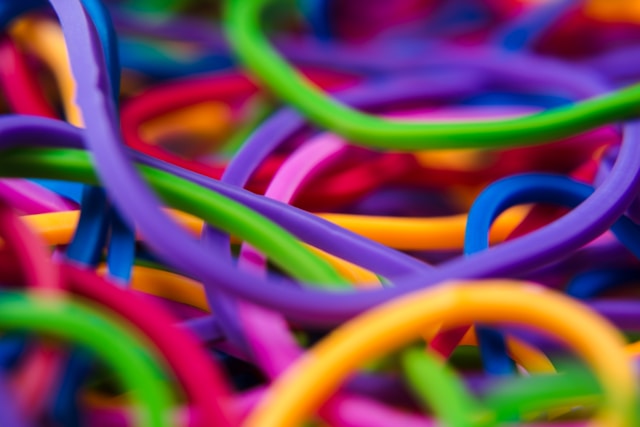To celebrate episode 150, I’m telling you all about how I actually managed to make it this far on the podcast. Why I lost momentum in the middle, the way it impacted me, and how I got back to publishing consistent weekly episodes and progressed steadily.
If you’d prefer to 🎧 listen to this episode, go here. Or continue reading the edited transcript...
Here’s a message from someone who reads my newsletter, The Feel Good Tribe. He also listens to this podcast.
“Hello world, this is Kevin. Currently I’m pursuing a BSE in Computer Science and Physics. I love to study computer science coding and artificial intelligence. I enjoy reading Susmitha’s The Feel Good Tribe Newsletter and listening to The Feel Good Factor Podcast, because it’s nourishing and healing. I’m gaining a lot of real life practical knowledge and inspiration, insights into life, veganism, authenticity, self-confidence, positive thinking, going with the flow, flow state, mindfulness, meditations, effects of technology, smartphones and social media apps etc.”
Kevin, thank you so much for your kind words! It makes me really happy to know you’re enjoying the newsletters as well as the podcast.
Hey hey hey! We’re on episode 150 of The Feel Good Factor!
I’m super, super excited. *delighted laugh* I know it’s just another number, and any number is a cause for celebration and all that. But still, sometimes these little milestones? They add a bit of a kick, a bit of excitement to life.
So since I’ve come up to 150 episodes, I wanted to share a little bit about…
How to keep consistently creating and progress steadily
I launched The Feel Good Factor at the end of 2019. On 28th December 2019. And I started off by diligently publishing one episode every Tuesday.
It was great for a while! For nearly a year I was publishing one episode a week without fail, that too specifically on Tuesday mornings. I record it on Monday, and then published it or Tuesday.
If I’d kept up with that, then yes there’d be far more episodes than 150 on the show. *laughs* But somewhere along the way, I kind of slipped (metaphorically slipped, not in real life, thankfully). One episode a week became one in two or three weeks. And then slowly I stopped doing that too. I was doing once in a month, once in two, three months. I slowly lost track of the original consistency.
Sure, a lot of things happened in life, but more than that, it was just me not really putting in the kind of effort I was putting in at the beginning.
But then at the end of 2022, I think September or October, somewhere around the 75th episode, I became consistent again.
I just restarted after a very long break
Like after four or five months of no episodes, I suddenly restarted the podcast, and then I became consistent once again.
I was doing one episode a week, diligently no matter what. Whether I was sick, whether I was travelling, it didn’t matter, I always had one episode published here, and I’ve been doing that regularly.
The difference, the reason this happened, and the reason I was able to get back to it and actually continue it the second time around, was because of a few things.
Those are the things I want to share with you, so that whatever project you’re involved in, anything you’re working on right now, it could probably give you ideas on how you can keep chugging along, keep moving forward. Bit by bit, but moving forward surely, instead of coming to a standstill and giving into inertia.

When we start something there’s a lot of momentum that gets built as a result of the hard work
This happened with the podcast initially. When I launched it I put in a lot of effort to promote it, and the momentum got built. People were listening all the time. And every time I published a new episode, there were a lot of listeners and downloads.
A lot of that was happening, but when I stopped publishing episodes regularly, I lost a lot of that momentum. All that hard work that had gone into it just got lost because I wasn’t continuing to freshly publish new episodes each week.
People who’re regular listeners found something else to listen to probably, or something else to fill their time with. So they didn’t come back to the podcast when I restarted it in 2022.
It took a lot more effort to get back that momentum than it did the first time around
It was a good lesson to me. I realised, this consistency, this momentum, even if it’s a slow momentum, a slow chugging along, it matters to keep things going. Otherwise yeah, a good chunk of the hard work goes down the drain.
Not all of it was wasted of course, because all the early episodes, people still find them and listen to them. Out of the blue people tell me, “hey I started listening to the earliest episodes of your podcast, and I’m binging on them.”
So it’s not like all the hard work is completely wasted. Once you put the work out there, it’s always available for the people who need it, the right people to find it. But that momentum building work is lost if you lose consistency, if you just give in to inertia.
So how do we keep going? Because there’s so much to do!
There are so many things that take up our attention, our time, our lives. So how do we make sure we keep going at something? Even at a very slow pace, but we keep going ahead.
The very first thing to let go of is perfectionism, being too particular about things
If you think, “the only way to do something is to do it properly”, that’s the beginning of your downfall.
I’m not saying it needs to be poor quality work, poor quality content that you put out there or whatever it is you’re doing. Like, if you’re writing something, building something, creating something, it doesn’t have to be low quality stuff. No, I’m not saying settle for that.
You put your best efforts, but don’t keep stressing about the details too much. Don’t keep tweaking, tweaking, tweaking to make it perfect and presentable. Making sure that it’s in great condition before it’s out in the world.

There are some basic things required, basic quality required, but beyond that you don’t have to fuss too much
The person who wants to listen to your work, read it, consume it, learn from it, they’re happy with actually getting the work at all. They don’t care if you made a few mistakes here and there.
After I recorded my episodes, I’d take a lot of time to sit and cut out the “ums” and “you knows”. All the fillers. I used to edit, edit, edit, edit so much! I realised over time, that’s not the most important thing.
If editing is going to delay things and then make sure that I’m not even publishing that episode once a week, if all that effort of editing is going to slow things down and not really get the work out there, then there’s no point.
The person who’s waiting for this week’s episode, they’d rather just get the episode! They’re more interested in what I have to say, and as long as it’s clear, without too much disturbance and all that in the background, as long as it has some level of decent quality, they don’t really care too much about the “ums” and “you knows” and stuff like that.
The real value of the work is in the work itself and not in too many of those refinements and details. So yeah, letting go of perfectionism has helped me come a long, long way.
The second thing is to make simplicity a priority
It kind of ties in with the first step. One way to make things simpler for yourself is to let go of perfection. But also, you can simplify things for yourself more and more and more in other ways. Simplicity plays such a key, significant role in progress!
The more complicated we make things for ourselves, the lesser the chances are of us progressing properly. And it’s not just the lesser chances of progress. If it’s too complicated, it may be fun in the beginning, but then we lose interest and let it go. We jump to another project instead.
Anything, when you start newly it’s all exciting, right? There’s that new relationship energy! But over time the excitement fades. And when the excitement fades, if it’s still very complicated, then the interest also completely fades, it just dwindles away. And you drop it.
Do you find yourself jumping from one project to another to another without actually seeing it all the way through? Or seeing it steadily through?
Like with a podcast, it’s not an all the way through thing, it’s just a steady thing. You just keep doing it once a week. There’s no end to it as such. But if it’s a book, if you’re creating a course, if you’re creating a work of art, whatever, if you’re working on any of these things, you need to ensure that you get to the end.
And if you see that you’re not, you’re starting one project, dropping it, going to something else, dropping it, put a lot of effort, then drop it…if you find you’re doing that, then take a look at how complicated you’ve made it for yourself.
There’s a very good chance that the complexity of getting the work done, moving it forward, that complexity is the biggest hurdle on your path.
Remove the complexity, make it super simple and then there’s no second thought about it. There’s no excuse. You just do it because it’s simple to do. It’s not a big deal. You’ll just do it.
So remember simplicity when it comes to making any kind of a progress, any kind of consistent productivity and creation, doing it in a state of flow. The simpler you make it for yourself the better.
To make it simple, have a good, solid look at all the excessive, unnecessary things involved in something
I’ve shared this before. For my podcast, each episode used to involve a bunch of steps. Initially I used to write it out. Not all the details, but I’d kind of put the points down on paper. Then I’d record it. Then edit, edit, edit. Put together fresh podcast art for every new episode. Then publish it. After that transcribe, put it on my blog, create content to promote it on Instagram, etc, etc, etc.
But later I trimmed out all the excesses, all the frills. I prioritised things. What’s the most important thing that has to get done now? And what can be done later (because it’s a good thing to have, it’s important, but not as important as the first thing)?
So then publishing an episode became just recording and publishing it. That’s the most important thing. And if that happens once a week? Fair enough.
I ditched this idea of creating podcast art for every single episode. Nobody’s really paying that much attention to it. It’s good to have, but really not a necessity. When it comes to the transcription and posting it on my website/blog, I take my time to do it. I don’t do it weekly anymore. I just keep steadily publishing episodes, and whenever I get a chance, that’s when I do the transcription and blog post.
Yes, I want it on my website, but it’s not something that adds pressure. It’s a separate step, an entirely different part of the process. And it has nothing to do with the recording and publishing part, which is the core, core thing.
So you shave, shave, shave, you whittle it down to the very core, and make sure it gets done. Everything else, you either ditch it, or keep it for later. That’s a very, very good way to look at the projects, the work you’re doing, and simplify things for yourself.
The third, and very important thing to keep in mind if you need to consistently, steadily progress in anything – keep things flexible for yourself
Even within the consistency, there needs to be flexibility. So you have this outer framework which is non-negotiable, but inside that, you can move things around, do things as you can. This ensures ease. That simplicity, and letting go of perfection? It supports it.
With the podcast for example, in the initial years, I’d make sure I’m publishing every Tuesday morning no matter what! And that would add pressure. It slowly sucked the fun out.
Now, I do one episode a week, but it doesn’t matter what day of the week, or what time. And doing it this way is not the suggested thing. Podcasters who’ve been doing it for several years, veteran podcasters say you need to publish on a specific day, at a specific time.
It’s like a TV show. Before Netflix and stuff we’d wait for shows on TV, right? Like, I’d be waiting on every Thursday evening, Buffy’s going to come on TV! I’d clear my schedule and make sure I’m watching it at that time. Similarly for podcasts, veterans say have it on a specific day of the week, specific time, so the listeners know when to expect it and all that.
You know, if you can do that, great! But there’s a good chance you may not be able to do it with whatever project you’re working on. In that case…
Be flexible. Don’t beat yourself up. Don’t be too hard on yourself.

Make sure you take out time to do it within the week, or whatever consistency you’re aiming for with your project. It could be a daily thing too. Just make sure there’s a slot carved out. But don’t be too particular about, this time, this date, and all that.
If it helps, put it in your calendar and progress at a specific time/date and all to get you into the swing of things. If it helps you, fine. But if it feels like pressure, or if you’re not able to do it at that time, don’t let go of it by saying, “I didn’t do it in time, there’s no use anyway, so I’m not going to do it.” Or, “I didn’t do it at 11 o’clock today in the morning, so I’m not going to do it now at 7 p.m.” Don’t think like that.
Give yourself some grace, be kind and gentle and compassionate to yourself. Allow yourself flexibility within a specific framework, and it helps ensure you’re getting things done. It keeps things fun and interesting and easy. And that’ll help the project move and flow forward steadily.
There are of course many more tools to consider when you want to progress in anything steadily, and consistently.
Just chug along you know. Even at a gentle pace. Especially at a gentle pace!
But these three things, if you keep them in mind, and you ensure you’re doing them, that itself is going to help you go a long, long way, and feel content, feel a sense of flow and ease through that process. It’s going to be fulfilling as you move ahead, as you keep making progress.
So the three things are, to recap:
- letting go of perfectionism
- prioritising simplicity about all else
- keeping things flexible for yourself
These three things, at least these three main things, if you keep them in mind, it’s going to help you a lot!
That’s the end of episode number 150
You know, initially when I wanted to publish this episode, my idea was to take clips from a lot of old episodes and do a mash up, like, a best-of thing. But then, that was too complicated. I was spending more time thinking about it and planning it than actually doing it.
So I’m like, “you know what? It doesn’t have to be on episode number 150. The idea is good, I’ll do it at another time when I have the time, the energy, all that. I can always do it later. But right now, episode 150 has to be out there!”
And yeah, what better topic than to talk to you all about how you can actually reach episode 150. I mean a symbolic episode 150 in whatever work you’re doing, whatever project you’re doing, the equivalent of that.
Alright, I’ll talk to you again next week. Take care!
Listen to the episode on the audio player below 👇🏽 (or on any podcast app that you like).
If this is your first time here, I invite you to find out more about The Feel Good Factor Podcast. If you think this content can help someone, do share the episode with them. I’d also greatly appreciate a rating/review wherever you listen to podcasts. They help the show get discovered by more people who resonate with this kind of message.
Susmitha Veganosaurus

“I read voraciously, find humour in most things, and I’m most in my element when I’m teaching, writing, and playing with clay. I believe authenticity and kindness are the keys to world peace. Sign up for myfree newsletterwhere I share conversational emails with stories about Life and Business Tips, Vegan Hacks, Holistic Guidance, and more.“